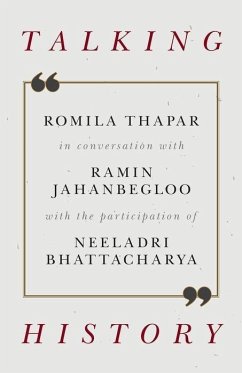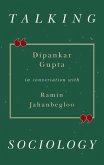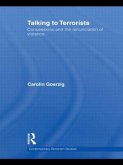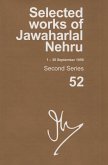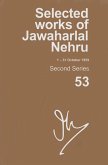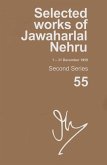Ramin Jahanbegloo, Romila Thapar, Neeladri Bhattacharya
Talking History
Romila Thapar in Conversation with Ramin Jahanbegloo
Ramin Jahanbegloo, Romila Thapar, Neeladri Bhattacharya
Talking History
Romila Thapar in Conversation with Ramin Jahanbegloo
- Gebundenes Buch
- Merkliste
- Auf die Merkliste
- Bewerten Bewerten
- Teilen
- Produkt teilen
- Produkterinnerung
- Produkterinnerung
This work is an interview of Romila Thapar, one of the most prominent historians from India. She discusses her life and career, as well as important concepts and issues in the discipline of history.
Andere Kunden interessierten sich auch für
![Talking Sociology Talking Sociology]() Dipankar GuptaTalking Sociology42,99 €
Dipankar GuptaTalking Sociology42,99 €![Golden Talking-Shop Golden Talking-Shop]() Edward PearceGolden Talking-Shop46,99 €
Edward PearceGolden Talking-Shop46,99 €![Talking to Terrorists Talking to Terrorists]() Carolin GoerzigTalking to Terrorists189,99 €
Carolin GoerzigTalking to Terrorists189,99 €![The Historian and Her Craft The Historian and Her Craft]() Romila ThaparThe Historian and Her Craft545,99 €
Romila ThaparThe Historian and Her Craft545,99 €![Selected Works of Jawaharlal Nehru (1-30 September 1959) Selected Works of Jawaharlal Nehru (1-30 September 1959)]() Selected Works of Jawaharlal Nehru (1-30 September 1959)53,99 €
Selected Works of Jawaharlal Nehru (1-30 September 1959)53,99 €![Selected Works of Jawaharlal Nehru (1-31 October 1959) Selected Works of Jawaharlal Nehru (1-31 October 1959)]() Selected Works of Jawaharlal Nehru (1-31 October 1959)69,99 €
Selected Works of Jawaharlal Nehru (1-31 October 1959)69,99 €![Selected Works of Jawaharlal Nehru (1-31 December 1959) Selected Works of Jawaharlal Nehru (1-31 December 1959)]() Selected Works of Jawaharlal Nehru (1-31 December 1959)69,99 €
Selected Works of Jawaharlal Nehru (1-31 December 1959)69,99 €-
-
-
This work is an interview of Romila Thapar, one of the most prominent historians from India. She discusses her life and career, as well as important concepts and issues in the discipline of history.
Hinweis: Dieser Artikel kann nur an eine deutsche Lieferadresse ausgeliefert werden.
Hinweis: Dieser Artikel kann nur an eine deutsche Lieferadresse ausgeliefert werden.
Produktdetails
- Produktdetails
- Verlag: Oxford University Press, USA
- Seitenzahl: 368
- Erscheinungstermin: 30. August 2017
- Englisch
- Abmessung: 221mm x 147mm x 30mm
- Gewicht: 481g
- ISBN-13: 9780199474271
- ISBN-10: 0199474273
- Artikelnr.: 47869001
- Herstellerkennzeichnung
- Libri GmbH
- Europaallee 1
- 36244 Bad Hersfeld
- gpsr@libri.de
- Verlag: Oxford University Press, USA
- Seitenzahl: 368
- Erscheinungstermin: 30. August 2017
- Englisch
- Abmessung: 221mm x 147mm x 30mm
- Gewicht: 481g
- ISBN-13: 9780199474271
- ISBN-10: 0199474273
- Artikelnr.: 47869001
- Herstellerkennzeichnung
- Libri GmbH
- Europaallee 1
- 36244 Bad Hersfeld
- gpsr@libri.de
Ramin Jahanbegloo is professor and vice dean and executive director, Mahatma Gandhi Centre for Peace Studies, O.P. Jindal Global University, Sonipat, Haryana. Romila Thapar is a renowned historian whose area of study is ancient India. She is the professor emerita at Jawaharlal Nehru University, New Delhi. Neeladri Bhattacharya is a professor at the Centre for Historical Studies at Jawaharlal Nehru University, New Delhi. He has researched and published on the making of the colonial rural order, custom, law and modernity, colonial power and discourse, and practices of history writing. His publications include Essays on the Commercialization of Indian Agriculture (1986, co-edited), Labouring Histories: Agrarian Labour and Colonialism (2004), and numerous articles on colonialism and agrarian society, and the representation of history.
Introduction: Thinking History in Critical Times
Part I: From Punjab to London
Chapter I: A Happy Half-Way
Chapter II: Religions and Storytelling
Chapter III: A Secular Environment
Chapter IV: Talking Politics
Chapter V: Following Gandhi
Chapter VI: Facing Hindu Fundamentalism
Chapter VII: Living with the British
Chapter VIII: Reading Novels
Chapter IX: Discovering the Indian Classics
Chapter X: A Nehruvian Ideal
Chapter XI: A Radical-Minded Student
Chapter XII: Reading Philosophy
Chapter XIII: Hollywood or Bollywood?
Chapter XIV: Living in London in the 1950s
Chapter XV: Becoming a Historian
Chapter XVI: Return to India
Chapter XVII: Marx and Marxism
Chapter XVIII: Stalinism and After
Chapter XIX: Teaching at JNU
Part II: The Function of the Historian
Chapter I: Reading the Past
Chapter II: Is There a Pattern in History?
Chapter III: What Is a Historical Fact?
Chapter IV: Objectivity in the Work of a Historian
Chapter V: The Sources in History
Chapter VI: Is History a Single Voice?
Chapter VII: Is Historical Narrative a Rational System?
Chapter VIII: Historians and Philosophy of History
Chapter XIX: What Is Oral History?
Chapter X: What Is Historicity?
Chapter XI: A Two Way Process
Chapter XII: Which Authority Festures in Historical Research?
Chapter XIII: History and the Greeks
Chapter XIV: History and Epic
Part III: Modern Writing of Early Indian History
Chapter I: The Orientalists and the Utilitarians
Chapter II: What Is Oriental Despotism?
Chapter III: Kingship or Empire
Chapter IV: India without the British
Chapter V: Culture of Civilization?
Chapter VI: The Idea of the Indian Nation
Chapter VII: Tradition and Culture in India
Chapter VIII: Tradition and Non-Violence
Chapter IX: Going beyond the Blurriness
Chapter X: Memory and Forgetfulness
Part IV: Lineage and Kingship
Chapter I: Ashoka: Between the Ethical and the Political
Chapter II: Ashoka and Gandhi
Chapter III: Ashoka and Marxist Historians
Chapter IV: History and Charismatic Literature
Chapter V: Attitude towards Spiritualism and Mysticism
Chapter VI: A Rationalist Historian
Chapter VII: Communal Ideologies in India
Chapter VIII: The Role of Archaeology and Anthropology
Chapter IX: Blood, Kinship and Lineage
Chapter X: History and Political Ideologies
Chapter XI: The Ideas of Hindusim
Chapter XII: The Ideologues of Hindu Nationalism
Part V: The Historian and the Epic
Chapter I: Looking at the Epic
Chapter II: The Historicity of the Epic
Chapter III: The Two Levels of Temporality
Chapter IV: Concepts of Time
Chapter V: The Moderns and the Concept of Inevitability
Chapter VI: Linearity and Evolution
Chapter VII: The Heroes and Exile
Chapter VIII: Retaliation and Forgiveness
Chapter IX: Tragic Drama in India
Chapter X: Machiavelli and the Arthashastra
Part VI: Shakuntala and Somanatha
Chapter I: The Historian's Impulse
Chapter II: Somanatha and Communal Historical Writing
Chapter III: The Rashomon Effect
Chapter IV: Why Is Somanatha important?
Chapter V: The Centrality of the Event
Chapter VI: Is There an Indian Marxism?
Chapter VII: New Schools of History Writing
Chapter VIII: Looking at the Past
About the Author
Part I: From Punjab to London
Chapter I: A Happy Half-Way
Chapter II: Religions and Storytelling
Chapter III: A Secular Environment
Chapter IV: Talking Politics
Chapter V: Following Gandhi
Chapter VI: Facing Hindu Fundamentalism
Chapter VII: Living with the British
Chapter VIII: Reading Novels
Chapter IX: Discovering the Indian Classics
Chapter X: A Nehruvian Ideal
Chapter XI: A Radical-Minded Student
Chapter XII: Reading Philosophy
Chapter XIII: Hollywood or Bollywood?
Chapter XIV: Living in London in the 1950s
Chapter XV: Becoming a Historian
Chapter XVI: Return to India
Chapter XVII: Marx and Marxism
Chapter XVIII: Stalinism and After
Chapter XIX: Teaching at JNU
Part II: The Function of the Historian
Chapter I: Reading the Past
Chapter II: Is There a Pattern in History?
Chapter III: What Is a Historical Fact?
Chapter IV: Objectivity in the Work of a Historian
Chapter V: The Sources in History
Chapter VI: Is History a Single Voice?
Chapter VII: Is Historical Narrative a Rational System?
Chapter VIII: Historians and Philosophy of History
Chapter XIX: What Is Oral History?
Chapter X: What Is Historicity?
Chapter XI: A Two Way Process
Chapter XII: Which Authority Festures in Historical Research?
Chapter XIII: History and the Greeks
Chapter XIV: History and Epic
Part III: Modern Writing of Early Indian History
Chapter I: The Orientalists and the Utilitarians
Chapter II: What Is Oriental Despotism?
Chapter III: Kingship or Empire
Chapter IV: India without the British
Chapter V: Culture of Civilization?
Chapter VI: The Idea of the Indian Nation
Chapter VII: Tradition and Culture in India
Chapter VIII: Tradition and Non-Violence
Chapter IX: Going beyond the Blurriness
Chapter X: Memory and Forgetfulness
Part IV: Lineage and Kingship
Chapter I: Ashoka: Between the Ethical and the Political
Chapter II: Ashoka and Gandhi
Chapter III: Ashoka and Marxist Historians
Chapter IV: History and Charismatic Literature
Chapter V: Attitude towards Spiritualism and Mysticism
Chapter VI: A Rationalist Historian
Chapter VII: Communal Ideologies in India
Chapter VIII: The Role of Archaeology and Anthropology
Chapter IX: Blood, Kinship and Lineage
Chapter X: History and Political Ideologies
Chapter XI: The Ideas of Hindusim
Chapter XII: The Ideologues of Hindu Nationalism
Part V: The Historian and the Epic
Chapter I: Looking at the Epic
Chapter II: The Historicity of the Epic
Chapter III: The Two Levels of Temporality
Chapter IV: Concepts of Time
Chapter V: The Moderns and the Concept of Inevitability
Chapter VI: Linearity and Evolution
Chapter VII: The Heroes and Exile
Chapter VIII: Retaliation and Forgiveness
Chapter IX: Tragic Drama in India
Chapter X: Machiavelli and the Arthashastra
Part VI: Shakuntala and Somanatha
Chapter I: The Historian's Impulse
Chapter II: Somanatha and Communal Historical Writing
Chapter III: The Rashomon Effect
Chapter IV: Why Is Somanatha important?
Chapter V: The Centrality of the Event
Chapter VI: Is There an Indian Marxism?
Chapter VII: New Schools of History Writing
Chapter VIII: Looking at the Past
About the Author
Introduction: Thinking History in Critical Times
Part I: From Punjab to London
Chapter I: A Happy Half-Way
Chapter II: Religions and Storytelling
Chapter III: A Secular Environment
Chapter IV: Talking Politics
Chapter V: Following Gandhi
Chapter VI: Facing Hindu Fundamentalism
Chapter VII: Living with the British
Chapter VIII: Reading Novels
Chapter IX: Discovering the Indian Classics
Chapter X: A Nehruvian Ideal
Chapter XI: A Radical-Minded Student
Chapter XII: Reading Philosophy
Chapter XIII: Hollywood or Bollywood?
Chapter XIV: Living in London in the 1950s
Chapter XV: Becoming a Historian
Chapter XVI: Return to India
Chapter XVII: Marx and Marxism
Chapter XVIII: Stalinism and After
Chapter XIX: Teaching at JNU
Part II: The Function of the Historian
Chapter I: Reading the Past
Chapter II: Is There a Pattern in History?
Chapter III: What Is a Historical Fact?
Chapter IV: Objectivity in the Work of a Historian
Chapter V: The Sources in History
Chapter VI: Is History a Single Voice?
Chapter VII: Is Historical Narrative a Rational System?
Chapter VIII: Historians and Philosophy of History
Chapter XIX: What Is Oral History?
Chapter X: What Is Historicity?
Chapter XI: A Two Way Process
Chapter XII: Which Authority Festures in Historical Research?
Chapter XIII: History and the Greeks
Chapter XIV: History and Epic
Part III: Modern Writing of Early Indian History
Chapter I: The Orientalists and the Utilitarians
Chapter II: What Is Oriental Despotism?
Chapter III: Kingship or Empire
Chapter IV: India without the British
Chapter V: Culture of Civilization?
Chapter VI: The Idea of the Indian Nation
Chapter VII: Tradition and Culture in India
Chapter VIII: Tradition and Non-Violence
Chapter IX: Going beyond the Blurriness
Chapter X: Memory and Forgetfulness
Part IV: Lineage and Kingship
Chapter I: Ashoka: Between the Ethical and the Political
Chapter II: Ashoka and Gandhi
Chapter III: Ashoka and Marxist Historians
Chapter IV: History and Charismatic Literature
Chapter V: Attitude towards Spiritualism and Mysticism
Chapter VI: A Rationalist Historian
Chapter VII: Communal Ideologies in India
Chapter VIII: The Role of Archaeology and Anthropology
Chapter IX: Blood, Kinship and Lineage
Chapter X: History and Political Ideologies
Chapter XI: The Ideas of Hindusim
Chapter XII: The Ideologues of Hindu Nationalism
Part V: The Historian and the Epic
Chapter I: Looking at the Epic
Chapter II: The Historicity of the Epic
Chapter III: The Two Levels of Temporality
Chapter IV: Concepts of Time
Chapter V: The Moderns and the Concept of Inevitability
Chapter VI: Linearity and Evolution
Chapter VII: The Heroes and Exile
Chapter VIII: Retaliation and Forgiveness
Chapter IX: Tragic Drama in India
Chapter X: Machiavelli and the Arthashastra
Part VI: Shakuntala and Somanatha
Chapter I: The Historian's Impulse
Chapter II: Somanatha and Communal Historical Writing
Chapter III: The Rashomon Effect
Chapter IV: Why Is Somanatha important?
Chapter V: The Centrality of the Event
Chapter VI: Is There an Indian Marxism?
Chapter VII: New Schools of History Writing
Chapter VIII: Looking at the Past
About the Author
Part I: From Punjab to London
Chapter I: A Happy Half-Way
Chapter II: Religions and Storytelling
Chapter III: A Secular Environment
Chapter IV: Talking Politics
Chapter V: Following Gandhi
Chapter VI: Facing Hindu Fundamentalism
Chapter VII: Living with the British
Chapter VIII: Reading Novels
Chapter IX: Discovering the Indian Classics
Chapter X: A Nehruvian Ideal
Chapter XI: A Radical-Minded Student
Chapter XII: Reading Philosophy
Chapter XIII: Hollywood or Bollywood?
Chapter XIV: Living in London in the 1950s
Chapter XV: Becoming a Historian
Chapter XVI: Return to India
Chapter XVII: Marx and Marxism
Chapter XVIII: Stalinism and After
Chapter XIX: Teaching at JNU
Part II: The Function of the Historian
Chapter I: Reading the Past
Chapter II: Is There a Pattern in History?
Chapter III: What Is a Historical Fact?
Chapter IV: Objectivity in the Work of a Historian
Chapter V: The Sources in History
Chapter VI: Is History a Single Voice?
Chapter VII: Is Historical Narrative a Rational System?
Chapter VIII: Historians and Philosophy of History
Chapter XIX: What Is Oral History?
Chapter X: What Is Historicity?
Chapter XI: A Two Way Process
Chapter XII: Which Authority Festures in Historical Research?
Chapter XIII: History and the Greeks
Chapter XIV: History and Epic
Part III: Modern Writing of Early Indian History
Chapter I: The Orientalists and the Utilitarians
Chapter II: What Is Oriental Despotism?
Chapter III: Kingship or Empire
Chapter IV: India without the British
Chapter V: Culture of Civilization?
Chapter VI: The Idea of the Indian Nation
Chapter VII: Tradition and Culture in India
Chapter VIII: Tradition and Non-Violence
Chapter IX: Going beyond the Blurriness
Chapter X: Memory and Forgetfulness
Part IV: Lineage and Kingship
Chapter I: Ashoka: Between the Ethical and the Political
Chapter II: Ashoka and Gandhi
Chapter III: Ashoka and Marxist Historians
Chapter IV: History and Charismatic Literature
Chapter V: Attitude towards Spiritualism and Mysticism
Chapter VI: A Rationalist Historian
Chapter VII: Communal Ideologies in India
Chapter VIII: The Role of Archaeology and Anthropology
Chapter IX: Blood, Kinship and Lineage
Chapter X: History and Political Ideologies
Chapter XI: The Ideas of Hindusim
Chapter XII: The Ideologues of Hindu Nationalism
Part V: The Historian and the Epic
Chapter I: Looking at the Epic
Chapter II: The Historicity of the Epic
Chapter III: The Two Levels of Temporality
Chapter IV: Concepts of Time
Chapter V: The Moderns and the Concept of Inevitability
Chapter VI: Linearity and Evolution
Chapter VII: The Heroes and Exile
Chapter VIII: Retaliation and Forgiveness
Chapter IX: Tragic Drama in India
Chapter X: Machiavelli and the Arthashastra
Part VI: Shakuntala and Somanatha
Chapter I: The Historian's Impulse
Chapter II: Somanatha and Communal Historical Writing
Chapter III: The Rashomon Effect
Chapter IV: Why Is Somanatha important?
Chapter V: The Centrality of the Event
Chapter VI: Is There an Indian Marxism?
Chapter VII: New Schools of History Writing
Chapter VIII: Looking at the Past
About the Author

